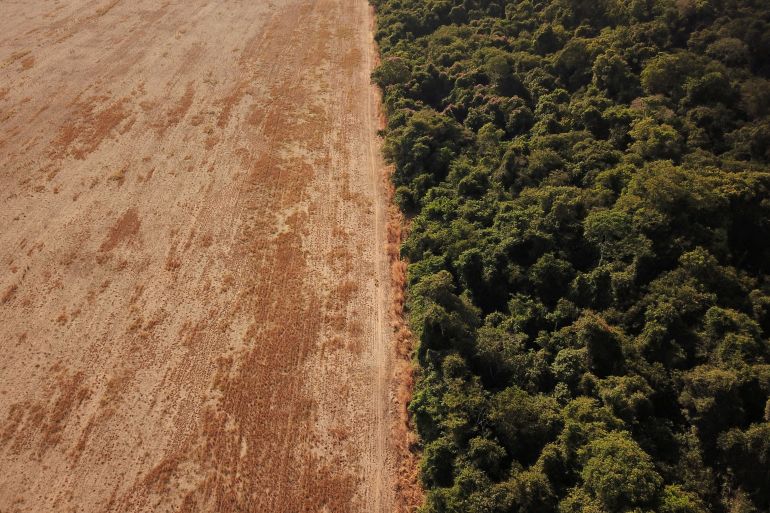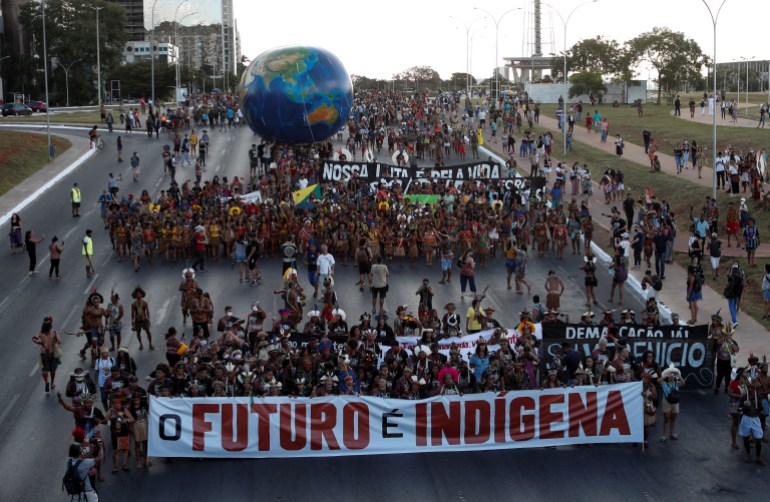Brazil sets ‘worrying’ new Amazon deforestation record
Brazilian Amazon sees 64 percent jump in deforestation in first three months of 2022 compared with a year earlier.

Brazil has set a new grim record for Amazon deforestation during the first three months of 2022 compared with a year earlier, government data shows, spurring concern and warnings from environmentalists.
From January to March, deforestation in the Brazilian Amazon rose 64 percent from a year ago to 941sq km (363sq miles), data from national space research agency Inpe showed.
Keep reading
list of 3 itemsEcuador’s Amazon residents seething after new oil spill
Deforestation in Brazil’s Amazon hits new record in January
That area, larger than New York City, is the most forest cover lost in the period since the data series began in 2015.
Destruction of the world’s largest rainforest has surged since President Jair Bolsonaro took office in 2019 and weakened environmental protections, arguing that they hinder economic development that could reduce poverty in the Amazon region.
Al Jazeera’s Monica Yanakiew, reporting from Rio de Janeiro, said the new data was especially worrying because Brazil is in the midst of its rainy season – a time when loggers typically do not cut down trees and farmers do not burn them to clear the land.
“So there should be less activity, there should be less deforestation,” said Yanakiew.
She added that the figures came as representatives of 100 Indigenous tribes are in the capital, Brasilia, to demand more protection for their lands and denounce proposed laws that would allow the government to further exploit the rainforest.
“They’re protesting to make sure that Congress will not approve bills that have been pushed by the government to make it easier to exploit the Amazon [rain]forest commercially. President Jair Bolsonaro is trying to get this done before he runs for re-election in October.”
The president’s office and the Environment Ministry did not immediately respond to requests for comment from the Reuters news agency on Friday’s deforestation data.
That data showed deforestation slowed by 15 percent for the month of March, but it followed two months of record highs.
The destruction is driven mainly by farming and land speculation in Brazil, an agricultural powerhouse and the world’s largest exporter of beef and soy. The country hosts about 60 percent of the Amazon rainforest.
Raoni Rajao, a professor of environmental management at Federal University of Minas Gerais, said the situation in the Amazon is “quite dire”.
“The fact that we are already at a record high and actually [seeing] numbers that are usually to be expected mid-year – when it’s drier and it’s actually easier to access the forest and do some damage – is indeed worrying,” Rajao told Al Jazeera.

He said deforestation coupled with climate change has had a “substantial impact” on the Amazon, even in areas further from human activity. “Even in the areas far away from the agricultural frontier, we’re starting to see the forest drying up and also become more prone to fires,” Rajao said.
“And this is very concerning because it indicates that we might be getting closer to a tipping point whereby the damage to the forest might become irreversible.”
A United Nations climate panel report on Monday warned that governments are not doing enough to rein in greenhouse gas emissions in order to avert the worst effects of global warming.
While fossil fuel use is mostly to blame, deforestation accounts for about 10 percent of global emissions, the report said.
“Brazil is an example of what the UN climate report is saying when referring to governments not taking the necessary actions,” said Cristiane Mazzetti, a forest campaigner in Brazil for Greenpeace. “We have a government that goes deliberately against the necessary steps to limit climate change.”